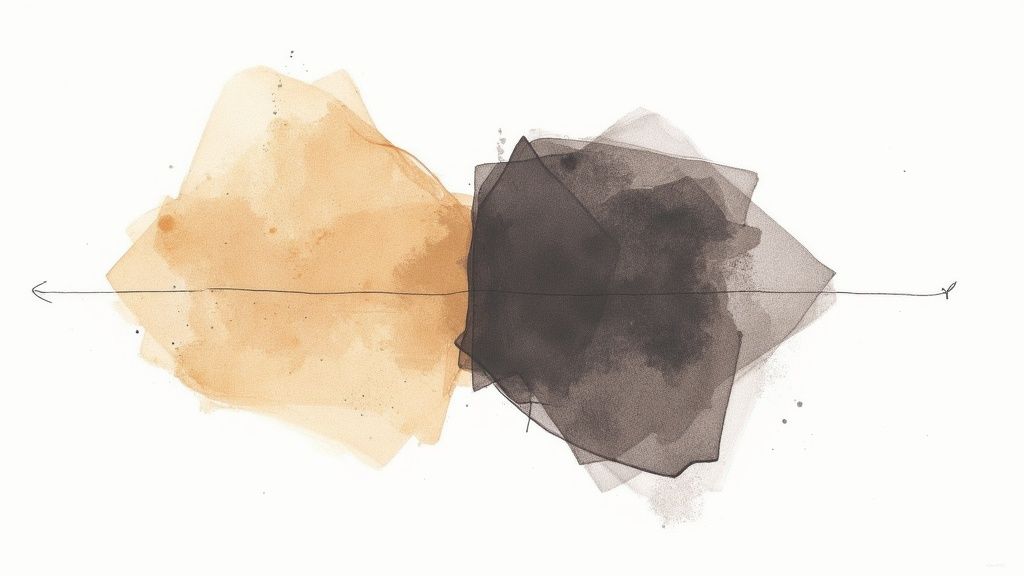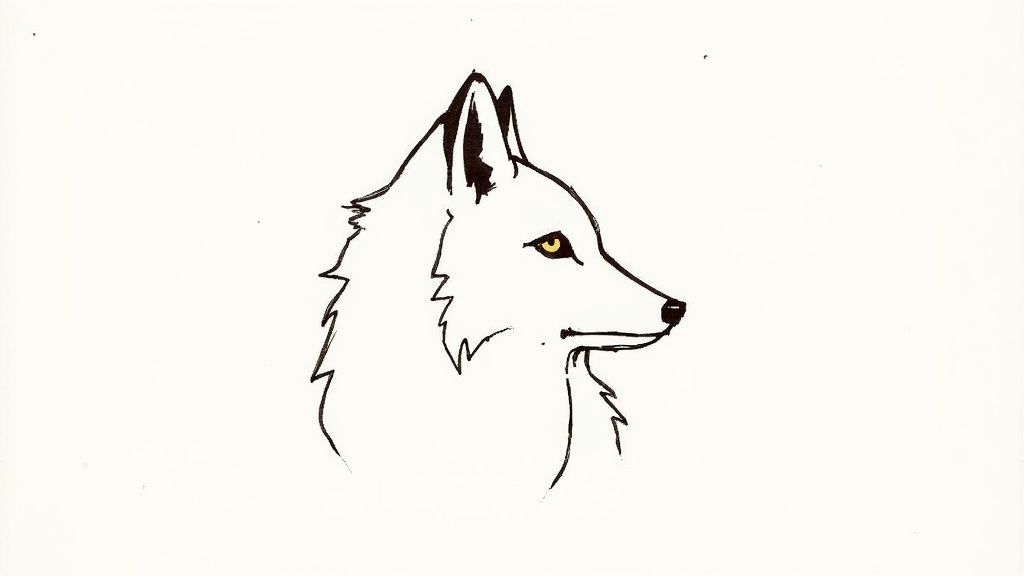10 Strategic Frameworks for Generating Band Names That Aren't Taken
Stop guessing. Explore 10 strategic ideas for band names, complete with frameworks and legal screening tips for founders ready to build a lasting brand.
A great band name is an asset. It signals your genre, connects with an audience, and—critically—can be legally protected. Generic lists of "ideas for band names" are a commodity. This is different. This is a strategist's guide for founders and artists who understand that a name is the cornerstone of a brand.
We'll bypass the fluff and deliver concrete frameworks for generating, screening, and selecting a name that works as hard as you do. This guide provides the decision criteria you need, whether you're considering an agency, a proven freelancer, or a powerful AI tool like Nameworm. We're moving beyond brainstorming and into strategic territory.
This article dissects 10 strategic naming archetypes, from geographic locations to invented words, weighing their pros and cons. Each section offers actionable insights and a clear path from initial concept to a defensible, market-ready brand identity. You won't just find a list of names; you will find a repeatable process for creating one that sticks, resonates, and stands out.
Key Takeaways
Strategy Before Creativity: A strong name starts with a clear brief defining your genre, audience, and desired emotional impact. Don't start with a dictionary.
Validation is Non-Negotiable: A "cool" name is useless if it's legally unavailable. Screening for domains, social handles, and trademarks isn't optional; it's the core of the process.
Archetypes Are Tools, Not Rules: Use these frameworks to generate ideas, but the best names often blend elements from multiple categories for maximum distinctiveness.
AI is a Co-Pilot, Not a Pilot: AI naming tools can accelerate idea generation and screening, but the final strategic decision requires human judgment and alignment with your brand vision.
1. Framework 1: Geographic & Location-Based Names
Choosing a band name based on a geographic location is a classic strategy that instantly grounds your brand in a specific context. This approach uses cities, states, or even landmarks to create an immediate association. It's a powerful way to suggest your band's origin, musical style, or a particular mood. Names like Boston or Chicago immediately connect to the American classic rock tradition they helped define.

This method provides excellent ideas for band names because it taps into pre-existing cultural shorthand. A name like Berlin might suggest cold, industrial electronic music, while Alabama Shakes brings to mind Southern rock. The key is aligning the location's perceived vibe with your sound.
Actionable Tips for This Framework
Align Vibe with Sound: Does your indie folk band sound like it came from a place called Canyon Creek? Does your synth-pop project have a Kyoto or Miami feel? The name must feel authentic.
Go Obscure or Personal: Instead of a major city, consider the name of your small hometown, a specific street, or a landmark that has personal meaning. This adds a layer of unique storytelling.
Combine and Modify: Add a descriptor to the location, like London Grammar or Lake Street Dive, to create a more distinctive and legally protectable name.
Pitfalls & Gotchas
The biggest risk is choosing a name that is too generic or already heavily associated with another famous entity, making trademarking and online discovery difficult. A name like "America" is taken and broadly used. Always conduct a thorough search for existing bands, company names, and trademarks before committing. Ensure the name is easy for a global audience to pronounce and spell.
2. Framework 2: Abstract Conceptual Names
Using an abstract concept for a band name is a sophisticated strategy for conveying a mood, philosophy, or emotional core without being literal. This approach relies on philosophical or high-level ideas to create a powerful, evocative brand. Names like Nirvana, Joy Division, or The Cure don't describe the music directly; instead, they tap into universal feelings, allowing listeners to form their own deep connections.

This framework provides fantastic ideas for band names because it creates an air of mystery and artistic depth. A name like Radiohead suggests themes of modern alienation and technological unease, while Oasis implies a sense of refuge or discovery. This method gives you a name that encourages interpretation.
Actionable Tips for This Framework
Align Concept with Sound: Does your ethereal dream-pop project fit a name like Reverie? Does your aggressive punk band embody Defiance? The abstract concept must feel like a genuine extension of your music's emotional landscape.
Explore Nuanced Words: Look for words with multiple layers of meaning. A term like Blur can refer to speed, uncertainty, or a visual effect, giving it rich branding potential.
Test for Impact: Say the name aloud. Does it sound powerful? Is it easy to remember and pronounce? The name should have an immediate phonetic and emotional impact. You can get more guidance from our article on creative business name ideas.
Pitfalls & Gotchas
The primary risk is choosing a name that sounds pretentious, overly complex, or emotionally disconnected from your actual music. If the concept is too obscure, it can alienate potential listeners. Always search for existing trademarks and ensure the name isn't already claimed by another artist or major brand. A simple, powerful concept is often more effective than a convoluted one.
3. Literary and Pop Culture References
Drawing inspiration from books, movies, or other media offers a shortcut to cultural connection. This approach leverages existing narratives to give your band an immediate sense of depth or attitude. It can attract fans who share your specific cultural tastes, creating a strong, niche community. Great examples include Joy Division (from a novel about Nazi concentration camps) and The Velvet Underground (taken from a book about subcultures).

This method provides fantastic ideas for band names because it imbues your project with a pre-packaged story and aesthetic. A name pulled from a sci-fi classic like Duran Duran (from Barbarella) instantly signals a futuristic feel. A reference to a Hermann Hesse novel like Steppenwolf suggests a more philosophical, counter-culture vibe. The reference's tone must match your sonic identity.
Actionable Tips for This Framework
Choose Timeless Over Trendy: A name referencing a fleeting meme will date your band quickly. Opt for classic literature, cult films, or enduring characters.
Ensure Contextual Alignment: Understand the full context of your reference. Naming your pop band after a tragic character could create an unintended dissonance.
Modify for Uniqueness: Take a phrase or character name and slightly alter it. This helps create a more original and legally protectable identity while still paying homage to the source.
Pitfalls & Gotchas
The primary risk is copyright and trademark infringement. Naming your band "Harry Potter" is a direct path to legal trouble. Wrong. Dead wrong. Always research the intellectual property status of a name. Additionally, a reference that is too obscure might alienate potential listeners, while one that is too obvious may feel uninspired. Your name should still resonate even if someone doesn't get the reference.
4. Animal Names
Using animals for band names is a time-tested approach that leverages the powerful symbolism creatures represent. This framework connects your sound to the inherent characteristics of an animal, whether it's the ferocity of a wolf or the soaring freedom of an eagle. From The Beatles and Eagles to modern acts like Arctic Monkeys and Wolf Alice, this method provides endless ideas for band names that are memorable and evocative.

This strategy works because animals come with built-in personalities. A name like Grizzly Bear immediately suggests a raw, powerful folk sound, while Vampire Weekend uses an animal-adjacent concept to imply something quirky and intellectual. The name becomes a shorthand for the band's entire vibe.
Actionable Tips for This Framework
Match Energy to Animal: Is your music aggressive and fast? Think predators like Shark or Tiger. Is it atmospheric and mysterious? Consider nocturnal animals like Owl or Moth. The animal's perceived nature should align with your musical identity.
Combine with Adjectives or Verbs: Make the name more unique and ownable by adding a descriptor. Think Tame Impala or Modest Mouse. This simple twist can help you stand out.
Explore Obscure Species: Instead of common animals, look to mythology (Griffin, Phoenix) or lesser-known species to create a more intriguing brand. This also increases your chances of finding an available name.
Pitfalls & Gotchas
The primary risk is choosing an animal name that is too common, leading to search engine obscurity and trademark conflicts. Names like "The Tigers" or "The Bears" are almost certainly taken. Always perform a deep search on streaming platforms, social media, and trademark databases. Be cautious of names that might unintentionally sound silly unless that is your specific goal.
5. Framework 5: Color-Based Names
Using a color is a classic way to generate ideas for band names that immediately evoke a specific mood or aesthetic. This approach taps into the powerful psychological associations people have with different hues, allowing a band to signal its sound before a single note is played. Bands like Black Sabbath and Deep Purple used colors to suggest dark, heavy sounds, while Green Day hints at a more youthful energy.
This method provides great ideas for band names because colors are universal symbols. "Red" might suggest passion and aggression, perfect for a rock band like Red Hot Chili Peppers. "Blue" can imply melancholy, fitting for blues-rockers like Blue Öyster Cult. The key is to select a color that reflects your band's sonic and thematic core.
Actionable Tips for This Framework
Match Color to Mood: Think about the emotions your music conveys. Is it angry (Crimson, Scarlet), melancholic (Azure, Indigo), or energetic (Yellow)? Align the color with your sound.
Combine with an Object or Concept: A single color can be too generic. Combine it with a noun for distinctiveness, like The White Stripes or Pink Floyd. This adds intrigue and makes the name more memorable.
Consider Your Visuals: Think ahead to your album art, stage lighting, and merchandise. A color-based name provides a built-in thematic element for your entire brand identity.
Pitfalls & Gotchas
The main risk is choosing a color combination that is already famous or too simple to be unique. Names like "The Blues" or "Black" are not only taken but are also too broad for effective branding and online searchability. Always conduct a thorough search. Also, consider cultural interpretations of colors, as their meanings can vary significantly across different regions.
6. Framework 6: Invented/Made-Up Words
Creating an entirely new word offers the ultimate blank slate for your band's identity. This approach involves coining a term from scratch or blending existing words to form a name that is completely unique. It’s a powerful strategy for artists who want to build a world around their music, free from pre-existing connotations. Names like Sigur Rós or MGMT become intrinsically linked to the band's specific sound, making them highly distinct.
This method provides excellent ideas for band names because it guarantees originality. An invented word is a completely empty vessel that you fill with your music and story. It's particularly effective for electronic, experimental, and avant-garde genres where a unique sonic identity is paramount.
Actionable Tips for This Framework
Prioritize Pronunciation: Your name should be easy to say. If fans can't pronounce it, they can't recommend it. Say the name aloud repeatedly to check its flow.
Check for Unintended Meanings: A cool-sounding word in English might mean something strange or offensive in another language. Do a quick search across major languages.
Combine Word Fragments: Blend parts of real words that evoke the right feeling. For instance, combining "luna" (moon) and "sona" (sound) could create Lunasona for a dreamy, atmospheric band.
Consider the Visuals: Think about how the name will look on album art and merchandise. The shape and letters of the word contribute to your aesthetic.
Pitfalls & Gotchas
The biggest risk is creating a name that is too abstract, unpronounceable, or difficult to spell, which kills word-of-mouth. A name like "Xyløphorn" might look cool but will constantly need to be corrected. For a deeper dive into creating a protectable brand name, you can learn more about tips for naming your company. Always ensure your invented word is truly unique and not accidentally similar to an existing trademark.
7. Science and Technology Terms
Drawing inspiration from scientific or technological concepts creates band names that suggest innovation, intelligence, and a forward-thinking perspective. This approach is perfect for bands aiming to project a modern or complex identity, often appealing to listeners interested in electronic, progressive, or experimental genres. Names like Kraftwerk ("power station") or Pendulum immediately signal a connection to mechanics and precision.
This method provides powerful ideas for band names because it leverages concepts that are both timeless and cutting-edge. A name like Algorithm or Circuit can evoke the structured nature of electronic music, while something more cosmic like Supernova hints at expansive, atmospheric soundscapes. The key is to find a term that reflects the complexity of your music.
Actionable Tips for This Framework
Match Concept to Sound: Does your intricate progressive rock sound like a Theorem? Does your glitchy electronic music feel like a System Error? The term should complement your artistic vision.
Explore Niche Fields: Look beyond basic physics. Concepts from biology (Mycelium), chemistry (Alloy), or theoretical mathematics (Fractal) can provide unique options.
Consider the Visuals: Scientific terms often come with strong visual symbols (like atomic structures or geometric patterns) that can be used for album art, logos, and merchandise.
Pitfalls & Gotchas
The primary danger is choosing a term that is either too obscure for your audience or so common it becomes generic. A name like "Technology" is too broad and unsearchable. Conversely, a highly specific term like "Magnetohydrodynamics" is difficult to remember. Always perform a thorough search to ensure the name isn't heavily used by tech companies or other artists, which could create brand confusion and trademarking issues.
8. Mythological and Historical References
Drawing from mythology, ancient history, or legendary figures provides ideas for band names that carry instant weight and storytelling depth. This approach taps into timeless tales and powerful archetypes, suggesting an epic scope or a sense of enduring power. Names like Led Zeppelin, Judas Priest, or Iron Maiden use historical and cultural references to create a larger-than-life persona.
This framework is effective because it leverages established narratives that resonate deeply. A name like Valhalla immediately evokes images of Norse gods and epic battles, making it a perfect fit for a heavy metal band. Similarly, a folk act might use a name from Celtic lore to suggest a connection to ancient traditions.
Actionable Tips for This Framework
Dig Deeper than the Obvious: Instead of well-known gods like Zeus or Thor, explore lesser-known figures, artifacts, or events. This gives your name a more unique and intriguing quality.
Match the Story to Your Sound: Ensure the narrative behind the name aligns with your music's emotional tone. A tragic figure's name might suit a melancholic indie band, while a warrior's name fits an aggressive punk group.
Ensure Pronunciation and Meaning: Choose a name that is reasonably easy for your target audience to pronounce and spell. Research its full context to avoid unintentional negative connotations.
Pitfalls & Gotchas
A significant risk is selecting a name with complex or sensitive cultural origins that could be misinterpreted or seen as appropriation. Always research the historical and cultural significance. Another common issue is choosing a name that is too common in a specific genre (e.g., Viking-themed names in metal), making it difficult to stand out. Perform a thorough search.
9. Numerical and Mathematical Names
Using numbers or mathematical concepts is a modern and effective strategy for creating a memorable band name. This approach leverages the clean, universal language of digits to craft names that are often easy to remember, spell, and search for. Bands like Blink-182 and Sum 41 used numbers to stand out in the crowded pop-punk scene, creating instantly recognizable identities.
This method provides excellent ideas for band names because numbers can be deeply symbolic or completely random. A name like Twenty One Pilots has a personal meaning to the band, while 3 Doors Down tells a literal origin story. The numerical element makes the name unique and less likely to be confused with a common phrase, a core principle in brand identity. For a deeper look, learn more about what makes a good brand name.
Actionable Tips for This Framework
Use Personal Significance: Choose a number that means something to the band—an address, an important date, or an age. This infuses the name with an authentic backstory.
Keep It Simple: While a complex equation might seem clever, a name like Four Year Strong is far easier for fans to remember than Epsilon Delta. Clarity wins.
Think Visually: Numbers have a strong visual presence. Consider how the name will look on merchandise and album art. The "5" in Maroon 5 is a simple, powerful graphic element.
Pitfalls & Gotchas
The primary risk is choosing a number that is difficult to pronounce or becomes confusing when written out (e.g., "Twenty One Pilots" vs. "21 Pilots"). This can split your search results. Also, ensure the number doesn't have an unintended negative connotation in another language or culture. Always search the number and its variations thoroughly to avoid overlap.
10. Emotional States and Human Experiences
Basing a band name on feelings or universal human experiences creates an instant emotional shortcut to your audience. This strategy taps into powerful, shared concepts like joy, anger, or loss, allowing your name to reflect your lyrical themes and musical mood. It’s an effective way to generate ideas for band names that promise a specific emotional journey. Names like Tears for Fears or Rage Against the Machine leave no doubt about the thematic content of their music.
This method is potent because it makes your band immediately relatable. A name like My Chemical Romance connects with fundamental aspects of the human condition, making the band feel personal. The name acts as a thematic signpost, attracting an audience that is actively seeking the catharsis your music offers.
Actionable Tips for This Framework
Align Emotion with Message: Ensure the chosen emotion accurately reflects your music's tone. A name like Panic! At The Disco perfectly captures the band's theatrical, high-energy pop-rock sound.
Explore Nuance: Instead of broad terms like "love" or "hate," consider more specific feelings like "longing," "serenity," or "dread." This creates a more unique identity.
Combine and Juxtapose: Pair an emotional state with an object or situation for a more distinctive name, such as Joy Division or Modern Guilt. This adds a layer of intrigue.
Pitfalls & Gotchas
The main risk is choosing a name that feels melodramatic or cliché, which can alienate listeners. It's crucial to test how the name is perceived. Also, perform a thorough search to ensure the name isn't already taken, especially within the emo, punk, or soul genres where this naming convention is common.
From Idea to Asset: The Validation Gauntlet
You've used strategic frameworks to generate a shortlist of potential names. This is where most DIY efforts fail. A cool idea is not a viable brand. Before you commit, every name must survive a rigorous screening process. This is the difference between a name and a defensible asset.
Decision Tool: Agency vs. Freelancer vs. AI
Option | Pros | Cons | Best For... |
|---|---|---|---|
Naming Agency | Deep strategic process, full legal screening, high-quality, defensible options. | High cost ($5k-$25k+), long timelines (weeks/months). | Well-funded startups or established bands where the name is a mission-critical, high-stakes asset. |
Proven Freelancer | More affordable than an agency, direct collaboration, experienced professional. | Quality can vary widely, less comprehensive screening process, may lack deep strategic rigor. | Bands with a solid budget ($1k-$5k) who value direct collaboration but don't need a full agency team. |
DIY / AI Tool | Extremely fast, low cost, massive idea generation, initial screening features. | Risk of generic output, requires user to drive strategy, preliminary screening is not legal advice. | Time-constrained founders who need to generate and pre-vet a large volume of ideas quickly and affordably. |
Caselet: From Generic to Protectable
Before: A new indie-pop band named themselves "Starlight." It was evocative but impossible to protect. They couldn't secure the domain, social handles were taken, and a trademark search revealed over 50 registered uses in music and entertainment. They were invisible online.
Process: Using a strategic approach, they defined their core sound as "nostalgic, cinematic, and slightly melancholic." They used an AI tool to generate ideas around these themes, focusing on two-word combinations.
After: They landed on "Faded Cassette." It passed domain, social, and preliminary trademark checks. It perfectly captured their sound, was highly searchable, and gave them a strong visual identity. Their search traffic increased by 300% in the first month compared to their old name.
The Essential Validation Checklist
Do not skip this. Run every single one of your final candidates through this framework.
Linguistic Stress Test: Is it easy to say, spell, and remember? Avoid names that require an explanation.
Domain & Social Handle Availability: Check for the .com domain and key social media handles. A fractured digital presence is a handicap.
Preliminary Trademark Screening: Use a tool like the U.S. Patent and Trademark Office's TESS database for a basic search. Look for identical or confusingly similar names in your class (e.g., musical performances). This is a filter, not legal advice.
Cultural & Connotation Check: Does the name carry unintended negative meanings in other languages or cultures? A quick search can prevent a major blunder.
Choosing a name with strategic rigor is one of the most impactful decisions you will make. It's not just a label; it's the cornerstone of your brand and your first piece of intellectual property.
Next Steps Checklist
Create a Naming Brief: Document your genre, audience, keywords, and desired emotional tone in one page.
Generate 50+ Ideas: Use the frameworks above and a tool like GPT to build a long list of candidates. Don't filter yet.
Run Top 5 Through Validation: Apply the essential validation checklist to your shortlist. Be ruthless.
Get Objective Feedback: Ask 3-5 people in your target audience for their gut reaction to your final 2-3 names. Listen for hesitation or confusion.
Consult Legal Counsel: Before you print merch or launch a website, get a professional trademark opinion.
Ready to move from endless brainstorming to a strategically sound, pre-vetted name without the guesswork? Nameworm uses advanced AI and a built-in validation process to generate unique, available, and brand-aligned names in minutes. Stop searching and start building your brand at Nameworm.